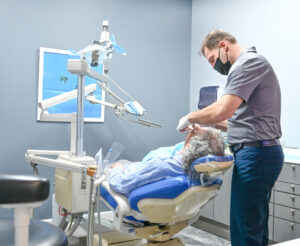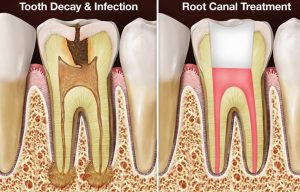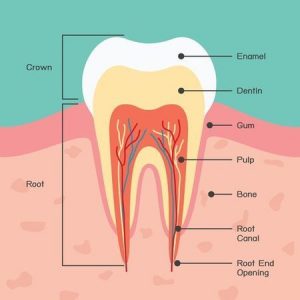Did you know that root canals don’t have to be a dreaded experience? Contrary to popular belief, root canal procedures have evolved significantly, turning them into a manageable and even comfortable dental treatment. In this blog post, we will debunk common misconceptions, explore the root canal procedure, and provide valuable tips on how to ensure a successful and stress-free experience, including answering the question, “how long does root canal take?”
By diving into tooth anatomy, infection causes, procedure steps, and recovery timelines, we aim to provide a comprehensive overview that will ease your concerns and prepare you for your upcoming root canal procedure. Let’s get started!
Key Takeaways
- Root canals are a dental procedure that treat infected pulp chambers, preserving the natural tooth and avoiding more invasive treatments.
- The complexity of an infection, as well as the location of the tooth and experience of the dentist affect root canal duration. They take between 30 minutes to an hour but may require multiple appointments.
- Post-procedure pain management is key for quick recovery. If unsuccessful, endodontic retreatment or apicoectomy can be performed to save your tooth’s functionality.
Understanding Root Canals
Root canals involve treating the infected pulp chamber inside a tooth to prevent further infection or tooth extraction. A thorough comprehension of tooth anatomy and the causes of root canal infections facilitates a better understanding of the significance of this dental procedure.
In essence, a root canal treatment can save your natural tooth and eliminate the need for more invasive treatments.
Pulp Chamber and Tooth Anatomy
The pulp chamber is the inner part of the tooth containing nerves and blood vessels. Tooth anatomy plays a critical role in the complexity of the root canal procedure. A healthy tooth structure can make the procedure more straightforward, whereas the presence of multiple roots or a cracked tooth may complicate the process.
The location of the tooth also influences the duration of the root canal procedure. Front teeth, for instance, tend to have simpler root canal procedures as they typically have only one root. In contrast, molars might have up to three roots, which could require a more complex root canal treatment.
Causes of Root Canal Infections
Root canal infections can be caused by a variety of factors, such as deep decay, cracks, or trauma to the tooth. Damage to the tooth may necessitate the need for a root canal if the damage reaches the pulp chamber, causing infection or inflammation.
Careful observation for potential infection after a root canal procedure is paramount for a successful outcome.
Root Canal Procedure Explained
A root canal procedure involves several steps:
- Numbing the area
- Creating an opening in the tooth
- Removing the infected pulp
- Cleaning and disinfecting the tooth
- Filling and sealing the tooth to prevent reinfection
Adequate preparation and diligent post-procedure care are vital for a successful root canal treatment.
We will further explore the steps involved in this dental procedure.
Preparing for a Root Canal Appointment
Preparing for a root canal appointment starts with discussing the procedure with your dentist and understanding the process involved. Tackling any concerns or dental anxiety you may have is crucial for a comfortable root canal experience.
Prompt scheduling of your root canal appointment is also important, as it enables you to experience relief from discomfort more quickly. Make sure to ask your dentist any questions you may have and follow their instructions to prepare for the appointment.
During the Procedure
During the simple root canal procedure, your dentist will:
- Administer local anesthesia to numb the area around the affected tooth, ensuring a comfortable experience.
- Create a small hole in the tooth.
- Remove the infected tissue.
- Meticulously clean the tooth to remove any remaining infection.
- Fill the tooth with a rubber-like material called gutta percha to seal the root canal and prevent reinfection.
In some cases, a temporary filling or a permanent crown may be placed on the tooth to protect it and restore its functionality. If a crown is necessary, the procedure may take up to 60 minutes and may require an additional appointment.
Post-Procedure Care
After the root canal procedure, it is essential to follow your dentist’s instructions to ensure optimal healing. This may include:
- Managing pain with over-the-counter pain relievers
- Keeping the area clean by brushing and flossing
- Avoiding hard foods until the permanent crown is in place
Adhering to a rigorous oral hygiene routine is also crucial for preventing reinfection and maintaining the success of your root canal treatment. This includes:
- Brushing twice daily
- Flossing once per day
- Limiting the consumption of sugary foods and beverages
- Attending regular cleanings with a dental professional
Factors Influencing Root Canal Duration
Several factors can influence the duration of a root canal procedure, such as the complexity of the infection, tooth location, and the dental professional’s experience.
Awareness of these factors is vital as they can alter the overall timeline of the treatment process.
Complexity of Infection
The complexity of the infected tooth directly affects the time needed to clean and disinfect the tooth during a root canal procedure. A more complex infection may require more time and effort to remove all infected tissue and guarantee the eradication of the infection.
Additionally, more severe infections may lead to a longer healing process and a longer timeframe before the patient can resume their usual activities.
Tooth Location
Tooth location plays a role in the duration of root canal procedures. Molars, for example, typically require more time for root canal treatment compared to front teeth. This is because molars have up to three roots, whereas front teeth usually have just one root.
As a result, molars may necessitate up to 90 minutes for a root canal procedure, while canines and incisors can be treated in 30 to 60 minutes.
Dental Professional Experience
The experience of a dental professional can have a significant impact on the duration of a root canal procedure. An experienced dental professional, such as a dentist in Rockville md, may be able to complete the procedure more efficiently and effectively, leading to a shorter duration and an improved outcome overall.
This underscores the value of choosing a proficient dental professional for your root canal procedure.
General Timeline: How Long Does a Root Canal Take?

In general, root canal procedures take between 30 minutes to an hour for simpler cases, with more complex cases potentially requiring up to 90 minutes or even a second appointment. The duration of the procedure is influenced by factors such as infection complexity, tooth location, and the dental professional’s experience.
Bear in mind that each case is unique, and the timeline may differ based on individual circumstances.
Single vs. Multiple Appointments
Whether a root canal procedure requires one or multiple appointments depends on factors such as the complexity of the case and the need for a dental crown. If a dental crown is necessary, the root canal procedure may take up to 60 minutes and may require an additional appointment to place the crown.
In most cases, however, a root canal can be completed in just one appointment, allowing for a faster recovery and return to daily activities.
Pain Management and Recovery Time

Consideration of pain management and recovery time is imperative after a root canal procedure. By properly managing discomfort and following your dentist’s instructions, most patients can return to their daily activities within a day or two.
Pain management is key to a successful recovery. Over-the-counter medications such as ibuprofen are best.
Managing Discomfort
Managing discomfort after a root canal procedure typically involves:
- Taking over-the-counter pain relievers, such as ibuprofen or acetaminophen, to alleviate any mild discomfort or swelling
- Applying an ice pack to the affected area
- Gargling with warm saltwater to reduce inflammation and promote healing
Good oral hygiene is also pivotal in managing tooth pain and thwarting reinfection post root canal procedure. This includes brushing and flossing regularly, using an antibacterial mouthwash, and avoiding hard or crunchy foods until the treated tooth has fully healed.
Returning to Daily Activities
The duration of time it takes for a patient to return to their daily activities after a root canal procedure depends on the individual’s healing process and the type of sedation used during the procedure. Generally, patients who undergo root canal therapy with local anesthesia or nitrous oxide can return to work or school the following day.
However, if oral sedation or IV sedation was used during the dental procedure, an extra day or two may be necessary for a full recovery.
What If My Root Canal Fails?
Root canal procedures generally achieve the desired results; failure is rare and occurs in only about 5% of all cases. Moreover, advances in dental techniques have made it even more unlikely that a root canal will fail. However, if the initial root canal treatment is unsuccessful, the tooth can still be salvaged through endodontic retreatment or an apicoectomy.
Both of these procedures aim to restore the tooth’s functionality and eliminate the need for tooth extraction.
Choosing the Right Dental Professional for Your Root Canal
Choosing an apt dental professional for your root canal procedure is critical for a successful and comfortable experience. Factors to consider when choosing a dental professional include their expertise, specialization, and patient feedback. Both general dentists and endodontists can perform root canal procedures, so it is important to choose a professional who has experience and expertise in the specific treatment you require.
Thorough research and selection of a proficient dental professional can notably enhance the outcome of your root canal procedure while minimizing potential complications. Remember, a successful root canal can save your natural tooth and prevent the need for more invasive treatments in the future.
Summary
In conclusion, root canal procedures have evolved significantly over the years, transforming them into a manageable and even comfortable dental treatment. By understanding tooth anatomy, infection causes, procedure steps, and recovery timelines, you can be better prepared for your upcoming root canal procedure and ensure a successful outcome.
Don’t let misconceptions and fear hold you back from seeking the dental care you need. With the right knowledge and a skilled dental professional at your side, a root canal can be a life-changing treatment that restores your oral health and preserves your natural teeth for years to come.
Frequently Asked Questions
How painful is a root canal?
Root canals are not more painful than regular dental procedures, such as getting a filling. Local anesthesia is used to ensure the patient doesn’t experience any pain during the procedure. Although there may be some mild discomfort after the root canal, it usually subsides with over-the-counter medication. Overall, root canals are not a painful experience.
Why do root canals take 2 visits?
Root canals require two visits due to potential infection, allowing the dentist to place medicine, like antibiotics, that promotes healing and clearing before continuing treatment.
How long does 1 root canal take?
Root canals typically take 30 to 60 minutes to complete, although more severe cases may require up to 90 minutes or even two appointments. The amount of time needed depends on the type and complexity of the tooth being treated.
Can I drive after a root canal?
It is generally safe to drive after a root canal procedure if no sedation was received. However, if you were given nitrous oxide or conscious oral sedation, you should not drive yourself home and should get a ride instead.
What is the best treatment for tooth mobility?
The best treatment for tooth mobility is a combination of non-surgical and surgical periodontal treatment, splinting, and occlusal adjustment.









